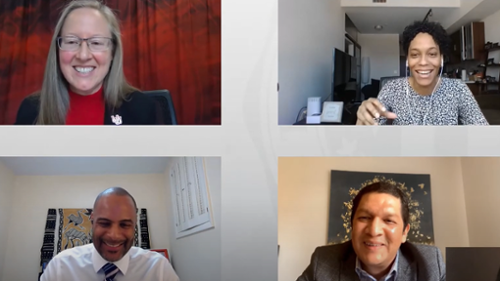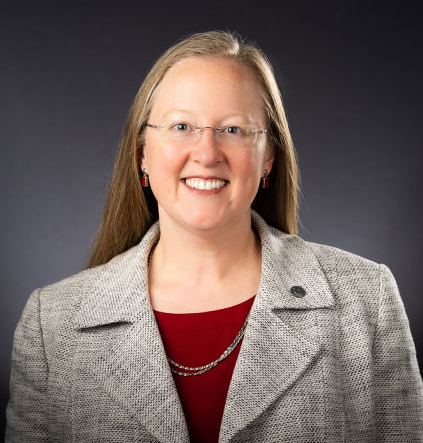Voices of U of U Health
Creating Policy to End Racism on Campus
Our journey to becoming an anti-racist campus continues in earnest. I recently had the opportunity to serve as moderator for the general session discussion on “Establishing Anti-Racist Policy” at the Oct. 23 Friday Forum on Racism in Higher Education. Developing and enacting policies that are free of inherent racial bias is no easy task. Three national thought leaders—Amelia Parnell, PhD, with NASPA; Eugene Anderson, PhD, with the APLU; and Noe Ortega, PhD, Acting Secretary of Education for Pennsylvania—shared valuable insights and perspectives about what it takes to move forward with anti-racist policy making.
Owning Our History
A recurring theme from the panel discussion was the importance of owning our history before we can create effective policies for the future. We must first acknowledge and understand the historical context of systemic racism in our institutions of higher education.

national thought leaders Amelia Parnell, Eugene Anderson, and Noe Ortega in 2020.
“[There are] inherent opinions about race that we need to face and eradicate before we can actually create unbiased policies,” Parnell explained. She cautioned against using denial in our response to the experiences of the Black community and other communities of color. “We don’t want to hurt people’s feelings, so we often say things we don’t really feel," she said. "This kind of denial needs to be explored and understood in order to move forward.”
As Student Affairs works with and on behalf of our students, we are making a concerted effort to avoid these pitfalls. There is a tendency to think about the “big picture” when making decisions, particularly around policy, but we need to value and intentionally consider the individual impacts as well.
Power of Listening
It takes all of us to change our campus culture into an environment where Black and other underrepresented members of our community feel a true sense of belonging. “We need to ask ourselves if we’re leaving anyone out of the conversation,” Ortega advised. “This process often requires difficult conversations about how you, as an academic and health care community, are actually facing the issue of race and racism.”
Fostering more student participation at the leadership level is critical to developing anti-racist polices for our campus. In my conversations with undergraduate student affinity groups, I keep hearing that we need to do a lot more listening than we have in the past. As leaders and administrators, we need to ask ourselves, “How do I listen to students, parents, staff, and faculty?” Only when we are really listening to what our community needs can we dig deep into our policies and practices to identify the things that need to change.
For example, undergraduates on main campus have asked us to look at our speech policy. As a public institution, the University of Utah has policies supporting the First Amendment and freedom of expression. While my generation fought for the right to have free speech, younger generations want us to consider how some speech can be harmful and suggest certain restrictions on such speech. For members of our campus community who may not feel safe or valued, hurtful speech will only cause more harm. This is something we are committed to taking a closer look at.
Committed to Long-Term Change
Drawing on our strengths as collaborators and innovators, we have begun an extensive audit of campus policies and regulations. The cross-campus partnership between Mary Ann Villarreal, PhD, vice president of Equity, Diversity and Inclusion (EDI), and José Rodríguez, MD, FAAFP, associate vice president for Health Equity, Diversity, and Inclusion (HEDI), is helping us dismantle the systems, processes, and policies that are harmful to our campus community. We are becoming more mindful of making sure that Black and other underrepresented members of our community are appointed to decision-making groups. Additionally, EDI and HEDI provide schools, colleges, and departments with anti-racism education, policy revision consultations, representation in hiring and admissions processes, and expanding equity, diversity, and inclusion positions within departments.
Becoming an anti-racist campus will not be easy or fast but we are committed to deliberate, careful change that will have a positive, long-term impact. We are in this for the long haul!
All U faculty, staff, and students are encouraged to participate in Friday Forums on Racism in Higher Education and submit breakout session proposals. The Nov. 20 Friday Forum will address ways to create a racially just workplace.
